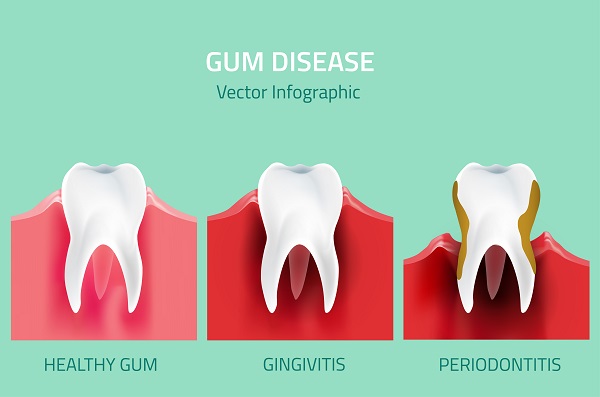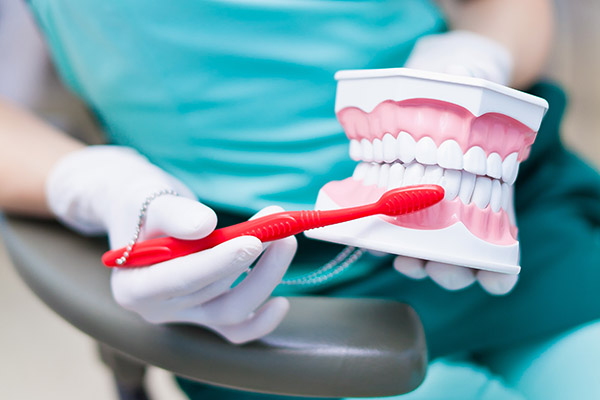Are Gum Disease and Gingivitis the Same Thing?

There are different stages of gum disease, with each stage being based on the severity of the infection. Because there are different stages of gum disease, it can be difficult to differentiate between each one. When trying to determine what stage the infection is at, it is best to begin with a visit with a general dentist.
Gum disease vs. gingivitis
Outlined below are overviews of gum disease and gingivitis. While the two do tend to overlap, there are a few key differences that are important to be aware of.
What is gum disease?
Gum disease is a serious infection in the gums that causes damage to the soft tissues. If gum disease goes untreated, patients may also experience damage to their teeth, such as tooth decay. Typically, the cause of gum disease is genetics, lack of oral hygiene or skipping routine cleanings with a dentist.
Dentistis often recommend oral rinses, as well as in-depth cleaning procedures that go beneath the gums. However, if the gums have begun to recede or if there is a shift in the teeth, then more invasive procedures may be required, such as soft tissue transplants.
What is gingivitis?
Gingivitis is typically the beginning stage of gum disease. Medically speaking, gingivitis refers to inflamed gums. When a patient suffers from gingivitis, they are likely to experience inflammation, which can appear as red, puffy or swollen gums. Typically, there is tenderness as well.
Gingivitis often occurs when there is a lack of oral hygiene or when the patient skips routine cleanings with their dentist. Often, it can be treated through a procedure known as scaling and root planing, which is just a more in-depth cleaning of the soft and hard tissues within the mouth.
Similarities and differences
Gingivitis is a form of gum disease, which means that there are symptoms that overlap. When a patient experiences overall gum disease, it is likely that the infection is severe. However, if the gums are just inflamed, then it is likely that the patient only has gingivitis. The main difference is that gingivitis is such an early form of gum disease, patients will not likely experience bleeding or pain. Additionally, the teeth will not be affected, and the gums are not likely to recede.
However, one thing that remains constant for both gingivitis and gum disease is that the patient will experience inflammation. Inflamed gums are the number-one sign that an infection is present, especially as the disease progresses.
Learn more today!
Both gum disease and gingivitis can lead to serious complications if treatment does not take place. Working with a general dentist is a good place to start when experiencing a gum infection. Reach out today to learn more or to get started! Our team is here to help.
Request an appointment here: https://www.alluredentalchicago.com or call Allure Dental at (312) 248-7517 for an appointment in our Chicago office.
Check out what others are saying about our dental services on Yelp: Gum Disease in Chicago, IL.
Recent Posts
The CDC states that gum disease, also known as periodontal disease, is one of the leading oral infections in the United States. In addition, the National Institute of Health cites it as the most common culprit for adults losing teeth. Because the early stages of periodontal disease often do not have noticeable symptoms, many patients…
Gum disease is a serious condition that can result in a need for periodontal treatment. Treatment is needed in order to destroy the infection and prevent it from getting worse. Oftentimes, without treatment, a case of gum disease can become advanced, which can result in tooth loss, receding gums, and even jaw deterioration, all of…
Avoiding gum disease at all costs is essential, as once someone is diagnosed with this dental-related disease, it means that they are in need of additional dental treatment to restore their good oral health. Even though gingivitis is the mildest form of gum disease, it can still cause harm to one’s overall good oral health.Thinking…
Maintaining gum health is important to keep the oral cavity in good condition. Gum disease occurs when people fail to take proper care of their gums. It helps to know ways to improve gum health to prevent infections that can damage the soft and hard tissues of the teeth.Gum disease causes tooth loss if it…


